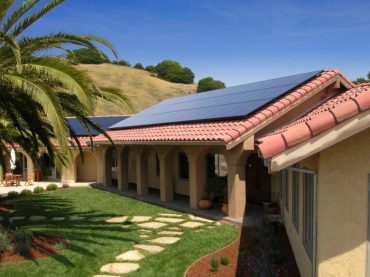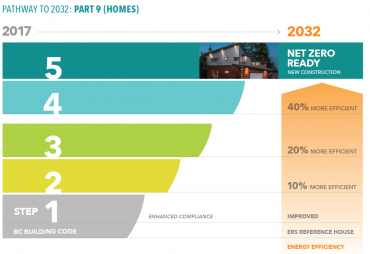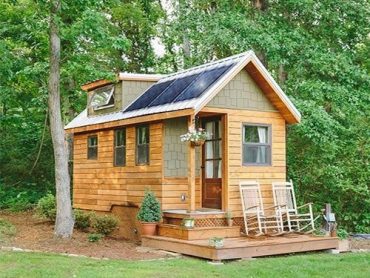
John Bleasby
California mandates solar roofs on new homes starting 2020
Canadian ContractorU.S. West Coast “collective madness” is a warning to Canada
They say that when a trend starts in California, the world soon follows, an assertion proven correct so many times in so many ways. Emission control standards for automobiles, smoking bans, modern gay rights —these are widely regarded today as positive contributions to 21st century life. However, there is one Californian trend that is disturbing: the over-regulation of new home construction. If Canada follows suit, the country may be smacked with the same self- inflicted damage to its residential construction industry as the U.S. West Coast; a bucket full of unintended consequences.

Solar PV arrays will be mandatory on all new California houses built starting 2020
Mandatory rooftop solar and storage systems by 2020
The latest ‘thing’ to hit the state’s new home construction industry is the California Energy Commission’s decision to approve a 2019 Building Energy Code requiring renewable energy access for all new residential homes in the state — in other words, mandatory rooftop solar generation and incentivized programs for energy storage for all new homes starting in 2020. As reported in Construction Dive, “This historic revision of building energy codes ensures a large investment in residential rooftop solar and energy efficiency as California pursues its mandate of getting 50% of its energy from renewables by 2030.”
This is great news for the solar industry. Any time government regulates, incentivizes or otherwise encourages solar rooftop arrays and accessories, the solar industry breaks out the champagne and the self-congratulatory rhetoric. “The combination of rooftop solar and the option to add energy storage systems as an efficiency compliance credit provides builders with an attractive, cost-effective option to fully electrify homes,” Abigail Ross Hopper, president and CEO of the Solar Energy Industries Association, said in a statement.
Consultation must precede regulation
Arguing against energy efficiency regulations is like making a case against mom and apple pie. However, the implications of these latest mandates for California’s new residential construction industry could be serious. It’s what Canadian Contractor’s new guest columnist Casey Edge calls “unintended consequences”. Edge, CEO of the Victoria Residential Builders Association (VRBA), has been an articulate and passionate critic of any government intervention impacting the housing industry that precedes proper consultation with stakeholders.
California’s residential construction industry is spinning out of control
Washington Post columnist and author Megan McArdle relayed observations and conversations after a recent trip to the U.S. West Coast. A Santa Barbara real estate agent told her that trailer park homes in the town can go for $600,000, what McArdle called, “an insane price to pay for a trailer and a place to park it.” She noted that this was symptomatic of California’s housing woes. “This sort of insanity is found all over California, to the point where it is approaching collective madness. That’s because California laws make it so expensive and difficult to build new homes. Between the environmental mandates, the building codes, the parking minimums, and the lawsuits filed by querulous neighbors who want everything to stay exactly as it is, forever, it’s small wonder that so many California cities top the list of places where rents are rapidly outstripping incomes.” Sound familiar, anyone?

BC’s Step Code looks great on paper, but has failed to engage many municipalities and has frustrated the residential building industry
BC’s Step Code gets a slap in the face
It’s an issue that should resonate with Canadians on our West Coast. As if British Columbia didn’t have enough housing problems given high land costs alone, the province has trumpeted its Step Code as a progressive and aggressive pursuit of energy-conscious home building regulations ahead of any national adoption. It’s been a symbolic dropping of the gauntlet, challenging the rest of the country to match its environmental initiative. However, Edge has been a strong critic of the Step Code on behalf of his VRBA members from the outset. Home affordability and the unintended consequences resulting from increased regulations cannot be ignored, Edge argues.
Basically, the Step Code allows individual municipalities in British Columbia to require energy efficiency thresholds for new homes beyond that set out by approved building codes, as they see fit. This provincial permission was granted prior to any meaningful due process, fact-finding or cost research. It also fails to recognize that most municipalities do not have the expertise to manage, supervise or assume the liability of such decisions. In fact, the B.C. Step Code is in direct conflict with the concept of a unified building code, argues Edge. “By enabling 160 municipalities to set their own energy efficiency level, B.C. undermines its own building standard,” he says. Furthermore, Edge suggests that, “by deviating from the National Code process, B.C. has put homeowners at risk and added significant cost for negligible benefit. Most energy loss is from decades-old homes, not new homes.”

Does the economic argument for residential solar stand scrutiny?
In terms of solar rooftop arrays themselves, McArdle puts forward the same concerns outlined by Canadian Contractor in recent months. “It’s hard to say exactly how much this new mandate will cost, since the requirement will vary by the size and location of the house,” she writes. “But it is safe to say that buying and installing panels, and paying the energy consultant to tell you how much capacity you need, will be in the high-four or low-five figures, even with the commission’s unproven assumption that the cost of solar installations will continue to fall.
“But what about the fabulous savings these homes will enjoy on electricity?” McArdle asks. “A conservative skeptic might retort, ‘If the savings are so fabulous, how come the market isn’t already installing the solar panels without regulatory prodding?’”
A warning shot to over-zealous regulators
Casey Edge’s campaign to bring sanity back into the NZE adoption process has been largely focused on his own jurisdiction of Victoria. In an email to Canadian Contractor, he said that his efforts in fact led to a defeat of a Step Code resolution at the Capital Regional District last week. In effect, this means the district and the City of Langford will, “disregard the Step Code and support the National Code process, removing 25% of Greater Victoria’s new homes from the B.C. Step Code. So much for B.C.’s claim of code uniformity.”
While environmental enthusiasts may consider Edge’s continued initiatives as disruptive, his advocacy is a matter of critical importance to the residential housing industry. Appropriate due process must be occur prior to the imposition of regulations. “The road to hell is paved with good intentions,” the saying goes. However, the unintended consequences of well-meaning initiatives that impact new homes and their buyers are matters that deserve attention, lest Canada slide down the same slippery slope as California.
Got feedback? Make your opinion count by using the comment section below,
or by sending an email to:
JBleasby@canadiancontractor.ca
Follow John on Instagram and on Twitter for notifications about his latest posts

![]()

Leave a Reply